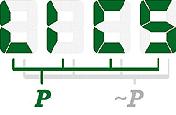Paper: Complexity Analysis Based on Ordered Resolution (at LICS 1996)
Authors: David Basin Harald GanzingerAbstract
We define order locality to be a property of clauses relative to a term ordering. This property is a kind of generalization of the subformula property for proofs where terms arising in proofs are bounded, under the given ordering, by terms appearing in the goal clause. We show that when a clause set is order local, then the complexity of its ground entailment problem is a function of its structure (e.g., full versus Horn clauses), and the ordering used. We prove that, in many cases, order locality is equivalent to a clause set being saturated under ordered resolution. This provides a means of using standard resolution theorem provers for testing order locality and transforming non-local clause sets into local ones. We have used the Saturate system to automatically establish complexity bounds for a number of nontrivial entailment problems relative to complexity classes which include polynomial and exponential time and co-NP.
BibTeX
@InProceedings{BasinGanzinger-ComplexityAnalysisB,
author = {David Basin and Harald Ganzinger},
title = {Complexity Analysis Based on Ordered Resolution},
booktitle = {Proceedings of the Eleventh Annual IEEE Symp. on Logic in Computer Science, {LICS} 1996},
year = 1996,
editor = {Edmund M. Clarke},
month = {July},
pages = {456-465},
location = {New Brunswick, NJ, USA},
publisher = {IEEE Computer Society Press}
}
